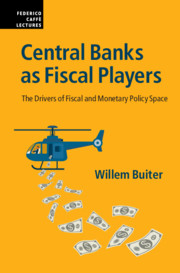Crossref Citations
This Book has been
cited by the following publications. This list is generated based on data provided by Crossref.
Baccaro, Lucio
Bremer, Björn
and
Neimanns, Erik
2021.
Till austerity do us part? A survey experiment on support for the euro in Italy.
European Union Politics,
Vol. 22,
Issue. 3,
p.
401.
Ferrero, Giuseppe
Pisani, Massimiliano
and
Tasso, Martino
2022.
Economic Challenges for Europe After the Pandemic.
p.
267.
Diessner, Sebastian
2022.
The promises and pitfalls of the ECB’s ‘legitimacy-as-accountability’ towards the European parliament post-crisis.
The Journal of Legislative Studies,
Vol. 28,
Issue. 3,
p.
402.
Masera, Rainer Stefano
2023.
Monetary Policy Normalization.
p.
13.
Leitão Amaro, Antonio
2023.
Separation of Powers and the Macroeconomic Constitution.
SSRN Electronic Journal,
Polański, Zbigniew
and
Szadkowski, Mikołaj
2023.
Monetary Policy Normalization and Central Bank Profits: A Break-Even Point Perspective.
The Economists’ Voice,
Vol. 19,
Issue. 2,
p.
161.
Diessner, Sebastian
2023.
The power of folk ideas in economic policy and the central bank–commercial bank analogy.
New Political Economy,
Vol. 28,
Issue. 2,
p.
315.
Broadbent, Ben
2023.
MONETARY POLICY: PRICES VERSUS QUANTITIES.
National Institute Economic Review,
p.
1.
Focacci, Antonio
and
Focacci, Angelo
2024.
A Re-Appraisal of the Role of Monetary Policy: The Quantity Theory of Money through a Structural Vector Autoregressive Approach.
Journal of Risk and Financial Management,
Vol. 17,
Issue. 8,
p.
355.
Focacci, Antonio
Focacci, Angelo
and
Faenza, Alessandro
2024.
The lens of the quantity theory of money to disentangle the perceived relationship between money growth and inflation: a PSVAR approach.
Eurasian Economic Review,
Vol. 14,
Issue. 3,
p.
571.
Diessner, Sebastian
2024.
The political economy of monetary-fiscal coordination: central bank losses and the specter of central bankruptcy in Europe and Japan.
Review of International Political Economy,
Vol. 31,
Issue. 3,
p.
1099.
Bateman, Will
and
van ‘t Klooster, Jens
2024.
The dysfunctional taboo: monetary financing at the Bank of England, the Federal Reserve, and the European Central Bank.
Review of International Political Economy,
Vol. 31,
Issue. 2,
p.
413.
Romelli, Davide
2024.
Trends in central bank independence: a de-jure perspective.
SSRN Electronic Journal,



